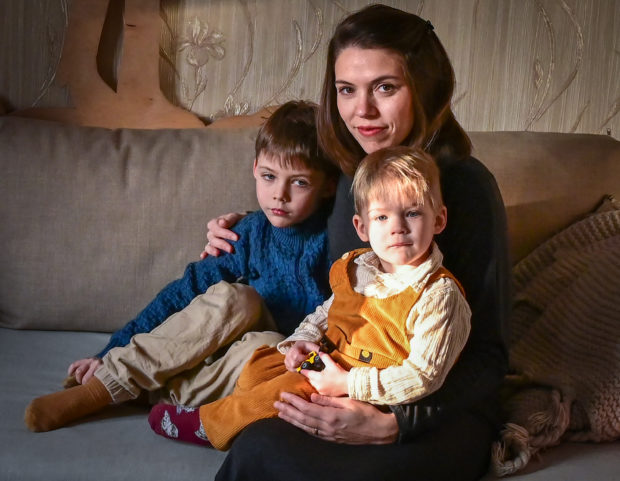‘It all fell on me’: Russian mothers alone as draft exiles dads

In this photograph taken on November 30, 2022 Yekaterina Filimonova, 34, poses with her children in their apartment. AFP
MOSCOW — Wrapped up in brightly colored snowsuits, Yekaterina Filimonova cycles through Moscow’s snow-blanketed streets with her three sons to their nursery.
Her husband used to drop them off but not anymore. Now living in exile abroad, he fled after President Vladimir Putin announced in September that Russian men were being drafted en masse to fight in Ukraine.
“He left and I got sick the next day. I was so stressed I didn’t recover for a month,” Filimonova, 34, told AFP.
Days after the call-up her husband Yaroslav Leonov grabbed his bike, took a train 1,500 kilometers (930 miles) to a city close to neighboring Kazakhstan and cycled over the border.
“He didn’t want to leave us,” Filimonova said.
Article continues after this advertisementBut she is not the only one facing the new burden of raising children alone. The chaotic and hurried exodus of tens of thousands of military-aged men has torn apart families and piled pressure on mothers across Russia.
Article continues after this advertisementThere are no figures on the numbers of families impacted, but one nursery employee in Moscow told AFP on the condition of anonymity that around a third of the fathers in one group were abroad.
“The first month was very sad of course. It was very hard for me and it was hard for the kids,” Filimonova said.
“When I’m upset, they get hysterical, they cry and they cry at night. And I realized that I have to pull myself together.”
Looking to history
The splintering in her family has got her thinking about her grandmother, who was separated from her geologist husband when he was sent to Mongolia for work.
“I’m beginning to understand how she felt,” Filimonova said. “I’d never thought about it before.”
Now in the Serbian capital Belgrade — a hub for exiled Russian IT workers — Leonov is struggling too.
The software developer saw no other choice than to leave Russia in September, fearing he could be drafted.
“I didn’t want to play Russian roulette,” he said. “Most likely, you’ll win but there’s a small chance of quite a dramatic end.”
In Belgrade, he reunited with an old maths teacher who left Russia shortly after Putin sent troops to Ukraine on February 24. They are now renting an apartment together.
But the relief of being safe has not eased the pain of separation.
“Remote children are not the same as remote colleagues,” he said, half-joking. “You cannot play with children remotely.”
In their cosy family apartment in Moscow, Filimonova gathers her sons so their father can read them a bed-time story in a video call.
She sent him photos of pages to read, while their young offspring hold the book, making faces at the computer.
“I hope my children understand that their daddy is here, he loves them — even from Belgrade,” he told AFP.
Russia announced the end of mobilization in late October but many abroad fear a second wave and Yaroslav sees “risks” in returning.
He is also questioning if there’s “even anything to return to”, with authorities imposing controls over the tech sector and “all aspects of reality.”
‘Life and death’ choice
Anastasia Arsenicheva, co-founder of a charity supporting mothers, said her organization received a surge in calls after the mobilization.
She said many women encouraged partners to leave, seeing it as a “choice between life and death”, but now are struggling.
“When a woman is in a vacuum completely alone, this is very scary,” Arsenicheva, a psychologist, said.
IT workers like Leonov can still support their families from abroad but this isn’t always the case, Arsenicheva added.
“There are some families where the man was the main breadwinner and it’s unclear how to support your life now,” she said.
Alexandra, a 32-year-old full-time mother in Moscow, had to quickly find a way to get by after her husband, who works in cinema and advertising, left.
He first went to a small mountainous city in ex-Soviet Tajikistan and then onwards to neighboring Uzbekistan, which has also become a centre for men evading the draft.
Alexandra previously did the occasional freelance knitting project that would cover the odd food shop while she looked after her seven-year-old daughter.
“When he left, it all fell on me,” she said, “and the family budget fell apart.”
She began to take on more projects and recently received an order to make more than 200 toys for the New Year, allowing her to employ several other women. She has also been restoring furniture and reselling it online.
She said she had “forgotten how to be self-sufficient… but when the guys left, we just had no choice!”
While she said she understood the decision of many men to leave — and even though the family’s future is uncertain — she is determined to stay put.
“I’m from Russia. I want to live in Russia. I never wanted to leave.”
RELATED STORIES
Neighbors see massive arrivals of Russians fleeing draft ‘chaos’
Russians fleeing Putin’s call-up sail to South Korea, most refused entry–report